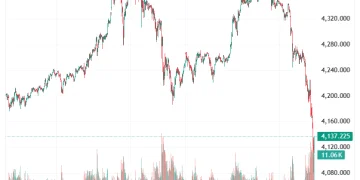Africa’s Fiscal Pressures Worsen Amid AfCFTA Implementation Push – UNECA Report
African economies continue to grapple with mounting fiscal pressures in the post-Covid-19 era, with high public debt levels, elevated interest rates, and subdued global demand tightening fiscal space and forcing governments to adopt contractionary policies, the United Nations Economic Commission for Africa (UNECA) has warned.
In its latest Economic Report on Africa, themed “Advancing the Implementation of the African Continental Free Trade Area (AfCFTA): Proposing Transformative Strategic Actions”, UNECA notes that while the AfCFTA remains a crucial lever for economic transformation, progress may be hindered by limited fiscal space and macroeconomic vulnerabilities.
According to the report, average fiscal deficits across Africa are projected to widen marginally in 2024, from -4.5% in 2023 to -5.0%, before gradually narrowing to -4.4% in 2025 and -3.9% in 2026. The temporary increase is largely driven by efforts to cushion the impact of rising food prices, subdued export revenues—particularly in resource-reliant economies—and increased capital outflows, partly linked to China’s slowing demand.
The fiscal deterioration is not uniform across regions. North Africa is expected to see the widest deficit jump—from 4.1% to 7.6% of GDP—owing to declining tax revenues and rising debt servicing costs. Southern Africa will also record relatively high deficits at 4.6%, largely due to elevated debt repayment obligations.
In contrast, West Africa is expected to strengthen its fiscal position slightly, reducing its budget deficit from 4.5% in 2023 to 4.4% in 2024, supported by improvements in countries such as Ghana, Nigeria, Côte d’Ivoire, and Sierra Leone. Central Africa is projected to post the lowest average deficits, underpinned by a rebound in commodity prices, including crude oil and minerals, while East Africa follows closely with stable fiscal metrics.
“Governments are expected to tighten their fiscal policies to reduce budget deficits and public debt burdens,” the report stated, adding that domestic revenue mobilisation will be critical as countries move to restore fiscal balance and meet rising public expenditure needs.
The report further highlights the procyclical nature of fiscal policies in Africa, which tend to reinforce rather than counteract economic cycles. However, there has been a shift in recent decades toward more countercyclical or acyclical policies, especially during major crises such as the 2009 global financial crisis and the Covid-19 pandemic.
Despite these strides, UNECA warns that high debt levels in many African countries are now constraining the adoption of countercyclical measures, limiting governments’ ability to invest in key sectors or implement stimulus packages.
Against this backdrop, UNECA reiterated its call for strategic action to unlock the full benefits of the AfCFTA, stressing the need for targeted industrial policies, harmonised trade regulations, digital trade infrastructure, and support for women-led and small businesses.
Key recommendations include:
Reducing tariffs and non-tariff barriers, and strengthening national AfCFTA implementation committees;
Developing regional value chains in sectors like agro-processing, pharmaceuticals, and renewables;
Integrating climate policies, including carbon pricing and clean energy investments—estimated at $22.4 billion between 2025 and 2040;
Streamlining customs procedures and deploying digital tools such as blockchain and electronic data processing;
Adopting gender-sensitive trade policies to promote women’s participation and entrepreneurship;
Enhancing policy coherence across regional economic communities through harmonised trade and regulatory frameworks.
“The AfCFTA presents a historic opportunity to drive structural transformation across Africa,” UNECA emphasised. “But success hinges on coherent fiscal policies, sustainable investments, and bold reforms to navigate existing economic headwinds.”








